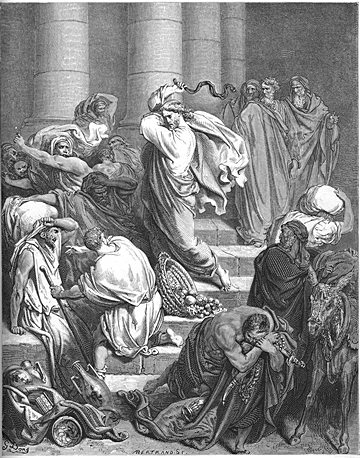Johana 2
1 Na rĩrĩ, mũthenya wa gatatũ nĩ kwagĩire na kihikanio kũu Kana ya Galili. Nyina wa Jesũ aarĩ kuo,
The third day, there was a wedding in Cana of Galilee. Jesus’ mother was there.
2 nake Jesũ na arutwo ake o nao nĩmetĩtwo kĩhikanio-inĩ kĩu.
Jesus also was invited, with his disciples, to the wedding.
3 Rĩrĩa ndibei yathirire, nyina wa Jesũ akĩmwĩra atĩrĩ, “Matirĩ na ndibei ĩngĩ.”
When the wine ran out, Jesus’ mother said to him, “They have no wine.”
4 Nake Jesũ akĩmũcookeria atĩrĩ, “Mũtumia ũyũ, ndĩ na ũhoro ũrĩkũ nawe? Ihinda rĩakwa rĩtirĩ rĩrakinya.”
Jesus said to her, “Woman, what does that have to do with you and me? My hour has not yet come.”
5 Nake nyina akĩĩra ndungata atĩrĩ, “Ĩkai ũrĩa wothe ekũmwĩra.”
His mother said to the servants, “Whatever he says to you, do it.”
6 Hau hakuhĩ nao nĩ haarĩ na ndigithũ ithathatũ cia maaĩ ciathondeketwo na ihiga, mũthemba ũrĩa wahũthagĩrwo nĩ Ayahudi magongona-inĩ mao ma gwĩtheria, na o ĩmwe yaiyũragio nĩ ngeereni kuuma mĩrongo ĩĩrĩ nginya mĩrongo ĩtatũ.
Now there were six water pots of stone set there after the Jews’ way of purifying, containing two or three metretes apiece.
7 Nake Jesũ akĩĩra ndungata icio atĩrĩ, “Iyũriai ndigithũ maaĩ”; nacio ikĩiyũria riita.
Jesus said to them, “Fill the water pots with water.” So they filled them up to the brim.
8 Agĩcooka agĩciĩra atĩrĩ, “Rĩu tahiai ĩmwe mũtwarĩre mũtabania wa iruga.” Nacio igĩĩka o ũguo,
He said to them, “Now draw some out, and take it to the ruler of the feast.” So they took it.
9 nake mũtabania wa iruga agĩcama maaĩ macio maagarũrĩtwo magatuĩka ndibei. Ndaamenyaga kũrĩa yoimĩte, o na gũtuĩka ndungata iria ciatahĩte maaĩ nĩciamenyaga. Hĩndĩ ĩyo agĩĩta mũhikania keheri-inĩ
When the ruler of the feast tasted the water now become wine, and did not know where it came from (but the servants who had drawn the water knew), the ruler of the feast called the bridegroom
10 akĩmwĩra atĩrĩ, “Mũndũ aambaga kũruta ndibei ĩrĩa njega, na ageni maarĩkia kũnyua mũno, agacooka akaruta ĩrĩa ĩtarĩ njega; no wee ũkũigĩte ĩrĩa njega nginya rĩu.”
and said to him, “Everyone serves the good wine first, and when the guests have drunk freely, then that which is worse. You have kept the good wine until now!”
11 Kĩu nĩkĩo kĩama kĩa mbere kĩrĩa Jesũ aaringire, na aakĩringĩire kũu Kana ya Galili. Akĩonania riiri wake, nao arutwo ake makĩmwĩtĩkia.
This beginning of his signs Jesus did in Cana of Galilee, and revealed his glory; and his disciples believed in him.
12 Thuutha ũcio agĩikũrũka Kaperinaumu, marĩ na nyina, na ariũ a nyina, o na arutwo ake. Magĩikara kuo matukũ manini.
After this, he went down to Capernaum, he, and his mother, his brothers, and his disciples; and they stayed there a few days.
13 Rĩrĩa Bathaka ya Ayahudi yakuhĩrĩirie-rĩ, Jesũ akĩambata, agĩthiĩ Jerusalemu.
The Passover of the Jews was at hand, and Jesus went up to Jerusalem.
14 Kũu hekarũ-inĩ nĩakorire andũ makĩendia ngʼombe, na ngʼondu, na ndutura, o na angĩ maikarĩte metha-inĩ magĩceenjia mbeeca.
He found in the temple those who sold oxen, sheep, and doves, and the changers of money sitting.
15 Nĩ ũndũ ũcio agĩthondeka mũcarica wa mĩkanda, na akĩmarutũrũra othe kuuma hekarũ-inĩ, hamwe na ngʼondu, na ngʼombe; akĩhurunja mbeeca cia arĩa maacenjagia mbeeca na akĩngʼaũrania metha ciao.
He made a whip of cords and drove all out of the temple, both the sheep and the oxen; and he poured out the changers’ money and overthrew their tables.
16 Nao arĩa meendagia ndutura akĩmeera atĩrĩ, “Eheriai ici gũkũ! Mwahota atĩa gũtua nyũmba ya Baba ndũnyũ!”
To those who sold the doves, he said, “Take these things out of here! Do not make my Father’s house a marketplace!”
17 Nao arutwo ake makĩririkana nĩ kwandĩkĩtwo atĩrĩ, “Kĩyo kĩrĩa ndĩ nakĩo kĩa nyũmba yaku nĩkĩo gĩkaandĩa.”
His disciples remembered that it was written, “Zeal for your house will eat me up.”
18 Hĩndĩ ĩyo Ayahudi makĩmũũria atĩrĩ, “Nĩ kĩama kĩrĩkũ ũngĩtũringĩra gĩa gũtuonia ũhoti ũrĩa ũrĩ naguo wa gwĩka maũndũ macio mothe?”
The Jews therefore answered him, “What sign do you show us, seeing that you do these things?”
19 Nake Jesũ akĩmacookeria atĩrĩ, “Thariai hekarũ ĩno, na nĩngũmĩaka rĩngĩ na mĩthenya ĩtatũ.”
Jesus answered them, “Destroy this temple, and in three days I will raise it up.”
20 Nao Ayahudi magĩcookia atĩrĩ, “Hekarũ ĩno yakirwo na mĩaka mĩrongo ĩna na ĩtandatũ, nawe ũkũmĩaka na mĩthenya ĩtatũ?”
The Jews therefore said, “It took forty-six years to build this temple! Will you raise it up in three days?”
21 No rĩrĩ, hekarũ ĩrĩa aaragia ũhoro wayo nĩ mwĩrĩ wake.
But he spoke of the temple of his body.
22 Na thuutha wake kũriũkio kuuma kũrĩ arĩa akuũ-rĩ, arutwo ake makĩririkana ũrĩa oigĩte. Nao magĩĩtĩkia Maandĩko, o na ciugo icio Jesũ aarĩtie.
When therefore he was raised from the dead, his disciples remembered that he said this, and they believed the Scripture and the word which Jesus had said.
23 Na rĩrĩ, hĩndĩ ĩrĩa aarĩ Jerusalemu hĩndĩ ya Gĩathĩ kĩa Bathaka, andũ aingĩ makĩona ciama iria aaringaga, nao magĩĩtĩkia rĩĩtwa rĩake.
Now when he was in Jerusalem at the Passover, during the feast, many believed in his name, observing his signs which he did.
24 No Jesũ ndaigana kũmeĩhokera, nĩgũkorwo nĩooĩ andũ othe.
But Jesus did not entrust himself to them, because he knew everyone,
25 Ndaabataragio nĩ ũira wa mũndũ, ũkoniĩ mũndũ ũrĩa ũngĩ, nĩgũkorwo nĩamenyaga kĩrĩa kĩrĩ thĩinĩ wa mũndũ.
and because he did not need for anyone to testify concerning man; for he himself knew what was in man.





















